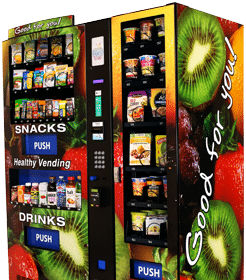The vending machine business is a popular entrepreneurial venture that offers flexibility, low operating costs, and passive income potential. For many, it’s an appealing way to start a small business with relatively low barriers to entry. However, starting a successful vending machine business requires planning, strategy, and a good understanding of the industry. This article will guide you through the essential steps on how to start a vending business and cover common questions that arise in the process.
What Are the Initial Costs Involved in Starting a Vending Machine Business?
The startup costs of a vending machine business can vary depending on the type of machines and scale of the business. Here’s a quick breakdown of typical costs:
- Vending Machines: Prices range from $1,000 to $5,000 for new machines, while refurbished machines may cost between $500 and $3,000.
- Stock: An initial supply of products can cost between $200 and $500 per machine.
- Permits and Licensing: Depending on location, permits can cost between $50 and $300.
- Maintenance and Repairs: Allocate about $100 per month per machine for routine upkeep.
Overall, a modest start with one or two machines can cost as low as $2,000, while a larger setup with more machines may require a more substantial investment.
How Do I Choose the Right Vending Machine Locations?
Location is one of the most important factors for a profitable vending business. To find prime spots:
- Look for High Traffic Areas: Places like schools, office buildings, malls, hospitals, and gyms are ideal.
- Negotiate with Property Owners: Offering a small percentage of profits or a flat rental fee can help secure prime locations.
- Understand Customer Needs: Choose products based on the demographic of the area, such as snacks and sodas for gyms or healthier options in office buildings.
Research each location’s foot traffic and consider conducting short surveys to understand what products might be in demand.
What Types of Vending Machines Are Best for Beginners?
Beginners often find success with simpler vending machines, such as:
- Snack and Beverage Machines: These are popular, and products have a high turnover rate.
- Combo Machines: These machines offer both snacks and drinks, maximizing space and offering variety.
- Healthy Vending Machines: With the rising demand for healthier food options, these can perform well in locations like gyms or corporate offices.
Combo machines are especially good for newcomers, as they allow you to serve a variety of products in a single location, optimizing space and customer satisfaction.
How Do I Decide What Products to Stock in My Vending Machines?
Product selection should match the preferences of your chosen location’s audience. Here are some popular categories:
- Traditional Snacks and Beverages: These are classic choices for many locations.
- Healthy Snacks: Protein bars, nuts, and fruit snacks are suitable for health-conscious locations.
- Specialty Items: In unique locations, consider adding items such as small electronics, cosmetics, or seasonal products.
Consider seasonal demand as well, adjusting your stock to meet holiday or climate-related preferences. Monitoring sales data will help you refine your inventory over time.
What Are the Legal Requirements or Permits Needed to Operate Vending Machines?
The legal requirements for a vending machine business vary by state and municipality. Common requirements include:
- Business License: Most areas require a standard business license to operate.
- Vending Machine Permit: Some locations require specific permits for vending machines.
- Health and Safety Regulations: Machines offering food or drinks may require health inspections.
Check with your local business bureau for regulations, as fines for unlicensed vending machines can be costly.
How Much Can I Expect to Earn from a Vending Machine Business?
Vending machine revenue can vary widely based on factors like location, products, and customer volume. Here’s an average income breakdown:
- Single Machine Earnings: An average machine in a good location might earn between $200 and $500 per month.
- Multi-Machine Setups: For larger setups with several machines, income can be significantly higher, potentially reaching thousands per month.
While vending machines won’t usually make anyone wealthy overnight, they can be a great source of steady, passive income when strategically managed.
What Are the Maintenance and Upkeep Costs for Vending Machines?
Maintenance is essential to keep machines operational and customer satisfaction high. Key costs include:
- Routine Cleaning and Stocking: Budget for monthly cleaning and regular restocking visits.
- Repairs and Technical Support: Set aside funds for issues like jammed products, broken screens, or faulty payment systems.
- Inventory Rotation: Ensuring products are fresh is essential for food machines, especially for items with expiration dates.
On average, expect to spend $50 to $100 per month on maintenance per machine, though costs can vary depending on machine type and frequency of use.
How Do I Find Suppliers or Distributors for Vending Machine Products?
Finding reliable suppliers is essential for competitive pricing and consistent stock. Some effective sources include:
- Wholesale Distributors: Companies like Sam’s Club, Costco, and vending-specific wholesalers offer bulk deals.
- Local Retailers: For smaller inventories, purchasing from retailers with bulk options can be convenient.
- Specialty Food Suppliers: If offering specialty or health-conscious items, look for suppliers that cater to specific dietary products.
Consider negotiating pricing with suppliers, especially if you plan to buy in bulk. Many suppliers offer discounts for larger orders or long-term business relationships.
What Are the Most Effective Ways to Promote a Vending Machine Business?
Marketing can increase your vending machine’s visibility and sales. Effective strategies include:
- Signage and Branding: Create appealing signage on the machine to attract customers.
- Promotions and Discounts: Offer discounts on specific products or occasional “free vend” days to boost interest.
- Networking with Location Owners: Build strong relationships with location owners to maintain good placement and visibility.
If you’re expanding your business, consider a website or social media presence to promote your vending services to potential location partners.
What Strategies Can I Use to Minimize Theft or Vandalism in My Vending Business?
Unfortunately, theft and vandalism can be risks with vending machines. Here are ways to protect your machines:
- Choose Safe Locations: Well-lit, supervised areas with regular traffic are less prone to vandalism.
- Install Security Features: Consider machines with sturdy locks, security cameras, or even alarms.
- Regular Monitoring: Routinely check machines for any signs of tampering or damage.
Some machine companies offer vending machines with reinforced glass and other anti-theft features, which can be a worthwhile investment for high-traffic or unsupervised locations.
Starting a vending machine business can be an accessible path into entrepreneurship, especially with the right planning and dedication. By understanding these core questions and following this guide on how to start a vending business, you’ll be well-equipped to build a successful, sustainable venture. Whether you’re placing your first machine or planning to expand, this industry offers ample opportunities for growth and passive income.



